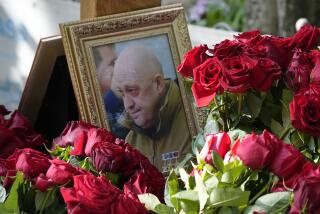6 Are Accused in Afghan Slaying
- Share via
KABUL, Afghanistan — Interim Prime Minister Hamid Karzai on Friday accused high-ranking government officials of masterminding the brutal slaying of Afghanistan’s aviation minister, who was killed during a riot at Kabul’s airport a day earlier.
Karzai charged that those responsible were motivated by a long-standing feud over political allegiances with the slain official, Air Transportation and Tourism Minister Abdul Rahman.
On Thursday, it had appeared that a mob of Muslim pilgrims had beaten Rahman to death in a rage over delays for flights to the annual Muslim pilgrimage, known as the hajj, to the Saudi holy city of Mecca. It was unclear how the government officials might have been involved in his death.
The allegations were perhaps the most unsettling sign that the factionalism that has long divided Afghanistan continues to fester even in the highest ranks of the fledgling administration, whose primary challenge is to restore law, order and unity to the war-torn nation.
“He was killed by people who planned it,” Karzai told reporters Friday night, accusing six senior government officials of the crime. Three were arrested Friday.
The accused men include Gen. Abdullah Jan Tawhidi, in charge of Afghanistan’s intelligence service, and Gen. Kalandar Beg, a deputy in the Defense Ministry. The others are members of the intelligence service and the Justice Ministry.
Some of the suspects went to Saudi Arabia with the pilgrims. “We are asking the Saudis to arrest them and bring them back. We will try them. We will put them behind bars,” Karzai said.
Underscoring the substantial law-and-order problems here, a soccer match between a squad of international peacekeepers and an Afghan team turned ugly Friday. Crowds desperate to enter the packed stadium were beaten back by local police wielding rifle butts and tree branches.
It was among the most serious challenges yet to the 3,200-member force dispatched by several nations to help police keep order.
A German peacekeeper fired his automatic rifle into the air, and several others targeted the mob with tear gas and pepper spray, while another took a cue from the Afghan police and starting shoving people with his rifle butt. Austrian peacekeepers used guard dogs and fire extinguishers to bring the crowd under control. Fifty soldiers and Afghans were injured but none seriously.
The soccer riot echoed the earlier mob scene at the airport. Clad in white sheets or robes and plastic sandals, hundreds of Afghans had been milling around the dilapidated airport’s runway by day and spending the freezing nights in an airport mosque so overcrowded that one woman was said to have died.
When Rahman boarded the chartered plane belonging to Afghanistan’s national airline, Ariana, bound for New Delhi, where he had been in exile for much of the Taliban’s rule, the crowd became enraged, witnesses said.
Witness Mohammed Rahim said the pilgrims surrounded the plane as it prepared to take off and appealed for the minister to address the crowd. As he emerged from the plane and began descending the steps, the minister fell--it wasn’t clear whether he tripped or was pushed by others--to the runway, where he broke his teeth and was mobbed by the crowd, Rahim said.
It wasn’t clear whether the accused officials were on the plane, part of the crowd or there at all. Several officials of Ariana Airways were injured, although one Western official said they had been injured in the main terminal building.
The crowd at the airport included pilgrims, many of their family members and just about anybody who wanted to be there. Just before the killing, security at the airport was so lax that a foreign reporter walked directly onto the runway through an open gate where many pilgrims stood before being shooed away by a guard who warned of “security” threats.
On Friday morning, however, the airport was ringed with police and guards, who stopped all but officials and pilgrims.
Throughout the country, Afghan pilgrims were having problems getting to Mecca, a journey that financially and physically able Muslims are urged to make at least once.
Most had paid about $1,500 for their tickets, a king’s ransom in this impoverished nation. Thousands also were stranded at airports in Herat in the west and Kandahar in the south. Some had traveled to Kabul, thinking that they had a better chance of getting on, and were camping out in the capital’s central mosque.
*
Times staff writer Maura Reynolds in Kandahar and Times wire services contributed to this report.
More to Read
Sign up for Essential California
The most important California stories and recommendations in your inbox every morning.
You may occasionally receive promotional content from the Los Angeles Times.














